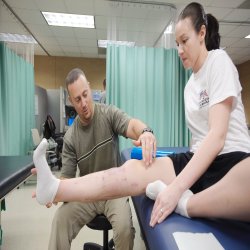A new study has found that subjects with stronger quadriceps muscle were actually more likely to develop arthritis in the knee compared to those with weaker quads.
Researchers studied 40,121 men at the age of 18 in order to assess their quadricep strength. Twenty-four years later, researchers followed up to determine which subjects were suffering from knee arthritis and which weren’t. The subjects with stronger quads at 18 were more likely to have knee arthritis in the future.
Conclusions
One possible explanation for these findings is that subjects with stronger quads have developed these increases in strength as a result of overusing the quads in place of the glutes. Because so many people suffer from weak hip extensors, many people have learned to substitute hip motion with excess knee motion, which would lead to stronger quads and increased load on the knee, eventually contributing to arthritis.
As a result, one could speculate that teaching people to strengthen their glutes in order to properly hinge and squat at the hips would take load off of the knee and help prevent arthritis. It would have been very interesting if the researchers had also tested the glute strength of these subjects to determine if strong quads correlated with weak glutes, but unfortunately that will have to be tested by future research.
References
